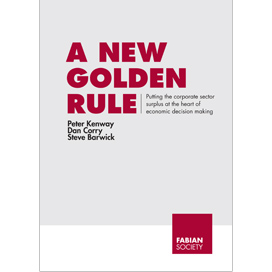A New Golden Rule: Putting the corporate sector surplus at the heart of economic decision making
The next Labour government should adopt a new fiscal rule seeking to reduce both the public sector deficit and the corporate sector surplus.

- A New Golden Rule
- Peter Kenway , Dan Corry , Steve Barwick
- 2 September 2012
While many of the immediate – and deeper – causes of the financial crash of 2008 rested elsewhere, in the years leading up to it the UK’s economy was becoming unbalanced. The public sector deficit is one aspect of this imbalance. But it is not the only one. Much less discussed is another side of it, the corporate sector – Britain’s companies, large and small – behaving as long term savers, spending less than they earn.
Labour, along with just about everyone else, missed this shift in the behaviour of the corporate sector balance. Previously, it had been cyclical; since 2002 it has become permanent. In the future, Labour must cope with the consequences of this shift and find ways of addressing it.
In order to give the corporate sector surplus the status it requires, in this Fabian Report, Peter Kenway, Dan Corry and Steve Barwick advocate that it should explicitly appear within a new golden rule, to capture the way that reductions in the public sector deficit depend upon reduction in the corporate sector surplus.
Authors
Fabian membership
Join the Fabian Society today and help shape the future of the left
You’ll receive the quarterly Fabian Review and at least four reports or pamphlets each year sent to your door
Be a part of the debate at Fabian conferences and events and join one of our network of local Fabian societies
Join the Fabian SocietyBe the first to know
Sign up to the free Fabian Society newsletter
Find out about the latest Fabian Society research, publications and events with our regular updates
Sign up today

